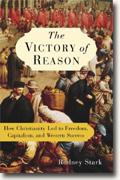The Victory of Reason
Rodney Stark
book reviews:
· general fiction
· chick lit/romance
· sci-fi/fantasy
· graphic novels
· nonfiction
· audio books
· author interviews
· children's books @
curledupkids.com
· DVD reviews @
curledupdvd.com
newsletter
win books
buy online
links
home
for authors
& publishers
for reviewers

 |
The Victory of Reason: How Christianity Led to Freedom, Capitalism, and Western Success Rodney Stark Random House Hardcover 304 pages December 2005 |
|
Some secularists would have you believe that capitalism, freedom and Western successes came from them and that Christianity had nothing good to do with it. Rodney Stark counters this falsehood, centering the foundation of his rebuttal on how Christianity, and especially the Catholic Church, provided the place to discover the idea of reason. His argument that reason began with Christianity, not with the Greeks or Romans - they had no use for it. It did not come from the Chinese or Muslims; their rulers did not allow their subjects to think about such things. It was Christianity that encouraged the idea of reason, freedom and economics - especially capitalism.
Stark reveals that, contrary to some secularists or communists, capitalism started with Italian city states like Milan, Venice, Genoa, and Florence, mainly because there was more freedom there than in areas under despots. The Church encouraged this freedom and was involved with the city governments to insure that freedom and prosperity grew. Stark discusses the so-called Protestant work ethic, something he says actually started with Catholics who wanted to make a better life for themselves and their children, taking pride in their work and prospering. In the relative freedom of the city states and other places where capitalism was encouraged, the economic situation was much better. People were more willing to make progress with technology and science. Where there was little freedom, which Stark shows was the case in Spain, France, and their colonies, progress was slow or non-existent. People did not really want to improve things if the only ones benefiting were the monarchy and other nobles. Stark shows that after the Italian city states fell into despotism, England and Holland were places where there were more freedoms to encourage progress. Other areas, like China and the Muslim empire, exemplify how the rule of despots hampered capitalism, technology, or science was hampered. He says that China and Islamic countries still have this problem, although China is beginning to slowly emerge. An interesting point regarding Catholicism in Latin America is raised. For years, many in Latin America were considered Catholics, even though many were only nominally so. When Protestants - especially Evangelicals and Pentecostals - came into Latin America, the Catholic clergy could not take for granted that the people of Latin America were truly Catholics. Stark says that church attendance was low and that many so-called Catholics really were not involved in the Church, but when the Protestants came in the Catholic Church had competition which, according to him, has increased church attendance and the people’s desire for better lives. He suggests that is why Christianity has done so well in the U.S. and Canada, since there is competition for adherents. Rodney Stark is a professor of Social Sciences at Baylor University. He has a Ph.D. from the University of California at Berkeley. He is the author of The Rise of Christianity (1996), Acts of Faith (2000), One True God: Historical Consequences of Monotheism (2003), For the Glory of God (2004), Exploring the Religious Life (2004), and others. This is a fascinating book, complete with endnotes, bibliography, and index, that will cause readers to more closely examine the relationship between economics and religion, rebuffing secularists who say that Christianity has not done anything good for the world. Promoting Christianity instead of bashing it, The Victory of Reason is also recommended by Fr. Richard Neuhaus and the economist Laurence R. Iannaccone. Originally published on Curled Up With A Good Book at www.curledup.com. © Br. Benet Exton, O.S.B., 2006 |
|
|
|
 Click here to learn more about this month's sponsor! |
|
| fiction · sf/f · comic books · nonfiction · audio newsletter · free book contest · buy books online review index · links · · authors & publishers reviewers |
|
| site by ELBO Computing Resources, Inc. | |
 Stark rebuffs the idea of that, during the so-called Dark Ages, Christianity had nothing to offer and that nothing of civilized note happened except the preservation of Greek and Roman ideals. Another recent book, How the Catholic Church Built Western Civilization (2005) by Thomas E. Woods, Jr., bolster Stark’s argument with lots of proof. Indeed, the so-called Dark Ages was not a time of nothing great being done; much was beginning to be done, mainly through the Catholic Church. Agriculture was progressing because of monasteries which had acquired large amounts of land and needed to use it more efficiently. Some towns developed around monasteries or other Church institutions for work and protection. The Church encouraged this and helped to spread the Church.
Stark rebuffs the idea of that, during the so-called Dark Ages, Christianity had nothing to offer and that nothing of civilized note happened except the preservation of Greek and Roman ideals. Another recent book, How the Catholic Church Built Western Civilization (2005) by Thomas E. Woods, Jr., bolster Stark’s argument with lots of proof. Indeed, the so-called Dark Ages was not a time of nothing great being done; much was beginning to be done, mainly through the Catholic Church. Agriculture was progressing because of monasteries which had acquired large amounts of land and needed to use it more efficiently. Some towns developed around monasteries or other Church institutions for work and protection. The Church encouraged this and helped to spread the Church.